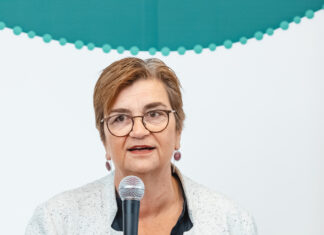Geelong research into links between pregnant women’s gut bacteria and their babies’ risk of developing allergies has won vital funding from a national health body.
The study overcame a “highly competitive application process” to secure a grant from the latest round of National Health and Medical Research Council (NHRC) grants, Deakin University said.
Peter Vuillermin, Professor of Paediatrics at Deakin’s School of Medicine, at Waurn Ponds, would use the funding to continue evaluating data from a study of infants across the Barwon region, Deakin said.
“Our hypothesis is that maternal carriage of gut bacteria known as prevotella is associated with decreased risk of a baby developing asthma and food allergies,” Prof Vuillermin said.
The study of Barwon Infant Study (BIS) data covered children aged four to seven, when asthma could be “clearly delineated”, he said.
“We’ll be doing that in the BIS Bus, a mobile laboratory for school visits.
“Allergies have become increasingly common, with up to 20 per cent of school-aged kids suffering from asthma, and 10 per cent of children will have a food allergy at some point in childhood.
“Australia has some of the highest allergy rates in the world but we don’t know why, nor do we have any substantially effective preventative strategies.
“We hope this research will eventually lead to a simple, cheap and effective method to prevent childhood allergies.”
Another member of the project team, Deakin PhD candidate and Geelong paediatrician Dr Lawrence Gray, received an NHMRC Post Graduate Scholarship alongside the study grant.
The scholarship would support Dr Lawrence’s final year of study as he evaluated some of the important findings of the first four years of the research project, Deakin said.
Cash boosts allergy study

Digital Edition
Subscribe
Get an all ACCESS PASS to the News and your Digital Edition with an online subscription
Good Friday Appeal provides regional funding boost
The Barwon South West will share in $3 million in funding from the Good Friday Appeal and The Royal Children’s Hospital (RCH) this year.
Victorian...








